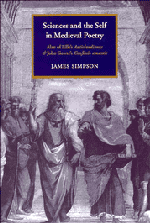 Sciences and the Self in Medieval Poetry
Sciences and the Self in Medieval Poetry Book contents
- Frontmatter
- Contents
- Acknowledgements
- List of abbreviations
- 1 Introduction
- 2 The outer form of the Anticlaudianus
- 3 A preposterous interpretation of the Anticlaudianus
- 4 Alan's philosopher–king
- 5 Ovidian disunity in Gower's Confessio amantis
- 6 Genius's psychological information in Book III
- 7 The primacy of politics in the Confessio amantis
- 8 Poetics
- 9 Conclusion: varieties of humanist politics
- Works cited
- Index
- CAMBRIDGE STUDIES IN MEDIEVAL LITERATURE
2 - The outer form of the Anticlaudianus
Published online by Cambridge University Press: 15 December 2009
- Frontmatter
- Contents
- Acknowledgements
- List of abbreviations
- 1 Introduction
- 2 The outer form of the Anticlaudianus
- 3 A preposterous interpretation of the Anticlaudianus
- 4 Alan's philosopher–king
- 5 Ovidian disunity in Gower's Confessio amantis
- 6 Genius's psychological information in Book III
- 7 The primacy of politics in the Confessio amantis
- 8 Poetics
- 9 Conclusion: varieties of humanist politics
- Works cited
- Index
- CAMBRIDGE STUDIES IN MEDIEVAL LITERATURE
Summary
EXTRINSIC INTRODUCTION – THE RECEPTION OF THE ANTICLAUDIANUS
Alan of Lille's Anticlaudianus was certainly one of the most widely read literary texts of the later Middle Ages. Written between 1181 and 1183, it was almost immediately accorded the status of what Chaucer would call ‘auctorite’. Alan's own pupil, Ralph of Longchamps, wrote a commentary on the work in 1212–13. In his prologue, Ralph says that he has written the commentary for two reasons: in the first place he wishes to render ‘the Anticlaudianus of Alan, the memory of whose love and friendship makes me weep, easier of access’; in the second, he wishes to exercise his own skill (ingenium). Ralph implies a certain challenge in meeting the work here, a challenge which was to be taken up by several other commentators in the early thirteenth century. In the changing intellectual climate of this period, Alan's poem was felt to represent a still powerful voice from the humanistic, literaryphilosophical culture of the twelfth-century schools: not only did William of Auxerre, and many other anonymous commentators, produce both commentaries and summaries of the work, but we also have a wonderfully vivid and telling evidence for the status of the poem in Henry d'Andely's Battle of the Seven Arts (written before 1236).
Henry pictures what is really a fight between Grammar, whose base is Orleans, and Dialectic, centred in Paris. The respective auctores of each city and each discipline confront each other in battle. Logic defeats the first attack of Grammar, whose assault troops are, by and large, classical poets.
- Type
- Chapter
- Information
- Sciences and the Self in Medieval PoetryAlan of Lille's Anticlaudianus and John Gower's Confessio Amantis, pp. 22 - 56Publisher: Cambridge University PressPrint publication year: 1995
- 1
- Cited by


